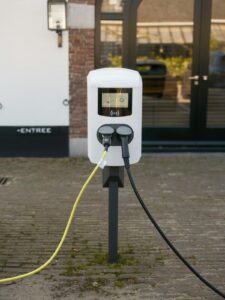
Home / EV Charging News / Battery Safety: Why Electric Vehicle Batteries are Safe but Incidents can still Happen
Electric vehicles (EVs) are a promising technology that can significantly reduce greenhouse gas emissions and promote sustainability. One of the most critical components of an EV is the battery, which stores electrical energy and powers the vehicle’s electric motor. While EV batteries are generally safe, there have been incidents of fires or explosions that have caused concerns about their safety. In this article, we will discuss why EV batteries are safe, the risks associated with them, and what can be done to mitigate those risks.
EV batteries are designed to be safe and reliable. Most modern EV batteries use lithium-ion technology, which is known for its high energy density, long cycle life, and low self-discharge rate. Moreover, EV battery manufacturers use advanced materials, manufacturing techniques, and quality control processes to ensure that their batteries meet stringent safety standards.
Lithium-ion batteries are also equipped with several safety features to prevent overcharging, overheating, and short circuits, which can lead to fires or explosions. For example, most lithium-ion batteries have a battery management system (BMS) that monitors the battery’s state of charge, temperature, and voltage. The BMS can prevent the battery from overcharging or discharging too much, which can damage the battery and pose a safety hazard.
Despite their safety features, there are still risks associated with EV batteries. The most significant risk is thermal runaway, which occurs when the battery’s temperature rises uncontrollably due to a short circuit, overcharging, or external damage. When a lithium-ion battery undergoes thermal runaway, it can release flammable gases and catch fire or explode.
Another risk associated with EV batteries is the potential for fire or explosion during the manufacturing process, transportation, or storage. Lithium-ion batteries contain flammable electrolytes, and if they are damaged, punctured, or exposed to high temperatures, they can ignite or explode.
To mitigate the risks associated with EV batteries, manufacturers, policymakers, and regulators need to take several measures. Here are some of the steps that can be taken:
If you own an EV and experience an incident involving the battery, such as a fire or explosion, it’s essential to take immediate action to ensure your safety and that of others. Here are some steps you can take:
EV batteries are a crucial component of electric vehicles, and they have come a long way in terms of safety and reliability. While incidents involving EV batteries are rare, it’s essential to understand the risks and take measures to mitigate them. By following safe charging practices, being aware of potential hazards, and knowing what to do in case of an incident, we can promote the safe and responsible use of EVs and contribute to a more sustainable future.
$2,890.00 Original price was: $2,890.00.$2,790.00Current price is: $2,790.00.
$3,950.00 Original price was: $3,950.00.$3,450.00Current price is: $3,450.00.
$1,650.00 Original price was: $1,650.00.$1,590.00Current price is: $1,590.00.
$2,290.00 Original price was: $2,290.00.$2,150.00Current price is: $2,150.00.
$1,290.00 Original price was: $1,290.00.$799.00Current price is: $799.00.

Your Power Management Partner for Over 25 Years Future Generations Depend on Our Decisions Today ™
2024 © All rights reserved by CyberSwitching